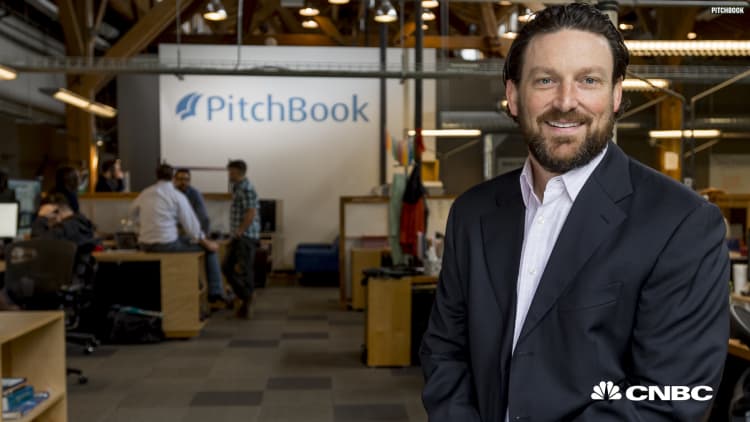John Gabbert grew up on a 250-acre farm in rural Northern California, raising pigs, sheep turkeys, chicken and ducks. He put himself through college with a half-dozen call center jobs, cold-calling people to sell them insurance, copiers and human resource services.
He went on to work in finance in San Francisco and launch a fin-tech startup, but it was his knack for picking up the phone and talking to strangers that he parlayed into the success of his future business.
Discovering a problem, deciding to fix it
In his time after college in finance research, Gabbert discovered a lack of clear research for private equity deals. He spent five years trying to get the firm he was working for to invest in its own software to improve the data. But the firm resisted.
How willing are you to power through and not worry about hundreds of people telling you that you are insane or that you have an idea that will not pay off?John Gabbertfounder and CEO of PitchBook
Gabbert decided that he would innovate himself. He hadn't necessarily been dreaming of becoming an entrepreneur. But when he found a problem, he decided to fix it, and that was the genesis of what would become PitchBook.
The Seattle-based company currently has 600 full-time employees, serves 2,000 elite corporate customers including Andreessen Horowitz, and has annual revenues of $50 million. In December, investment research firm Morningstar bought PitchBook for $225 million.
20 months sleeping on a pal's couch
In the early years, however, Gabbert was getting by on a hope and a prayer, as well as a deep conviction that he was creating a product that there was a market for.
"We build products that meet people's needs and we are very, very focused on customers. I was confident that there was a need for this information. I had done years of work in the space," says Gabbert, in a conversation with CNBC. "I was truly, 100 percent all-in on this."
Gabbert slept on a friend's couch for 20 months in San Francisco while he continued to work his full-time finance job and build the idea for PitchBook. His wife and kids moved to Seattle to be near family.
The process took longer than he had expected. "I didn't think that was going to take 20 months. I thought maybe it was going to take a few months," says Gabbert. He doesn't regret the time, though. That was when he developed a rock solid business plan for PitchBook, he says.
He formally launched the company in March 2007 in Seattle. In the first years, when he and his wife tracked his hours, they found he was regularly putting in over one hundred hours a week.
From 2005 through 2009, Gabbert reached out to more than 200 potential investors. He talked to angels and venture capital investors all around the world. No one was interested.
Part of the reason for the 200 rejections Gabbert received was timing: Just as Gabbert was pitching his financial services tech product in 2008, the finance industry was imploding.
Still, he managed to get a "yes" from 17 angels. "My closing ratio is about 8.5 percent," says Gabbert.
He raised $2.75 million in small investments, ranging from $50,000 to $100,000 each, to get the product going. Every dollar he raised went back into the company.
By the summer of 2009, he had $20,000 left. And he needed more money to get the company built.
Leaving a voicemail for a billionaire
"I would love to think that I had some secret. But truthfully, a lot of it is just wiring. The whole grit piece gets talked about. I think it's just that," says Gabbert.
"How willing are you to just power through and not worry about hundreds of people telling you that you are insane or that you have an idea that will not payoff? ... Yeah, I have grit. You just gotta power through."
About that time, Gabbert read an article in Crain's Chicago talking about Morningstar expanding its business portfolio. Gabbert knew that his product would help Morningstar in their new market.
He called the main line for Morningstar and left a voicemail for Joe Mansueto, the billionaire founder and CEO. Mansueto emailed him. Gabbert sent his two-page teaser. And Mansueto invited Gabbert to go to Chicago.
In September 2009, they made a deal. Mansueto wanted to invest $3 million, but Gabbert only took $1.2 million. He wanted to keep Pitchbook lean.
Gabbert had always been careful with money. He says he lost $20 in a bet on three-card-monty on the street in college and he's still angry about it.
When Gabbert received the $1.2 million from Mansueto, he had just $22,000 in the bank and owed $100,000 in accounts payable. He was cutting it close.
Now 42, with four kids, he is glad to have sold his company and be financially secure. Still, like many entrepreneurs, Gabbert found it hard to surrender the controls.
"I probably cried more than I smiled," he says.



